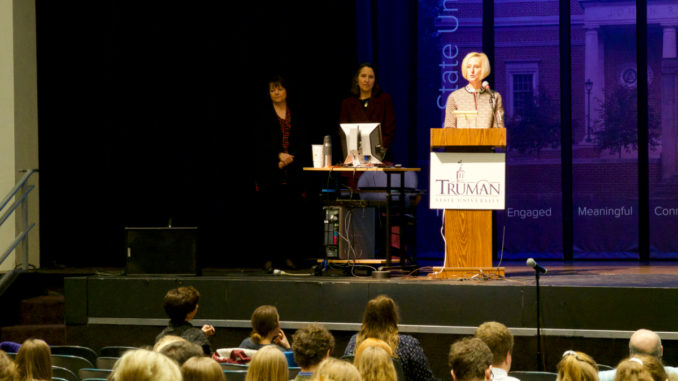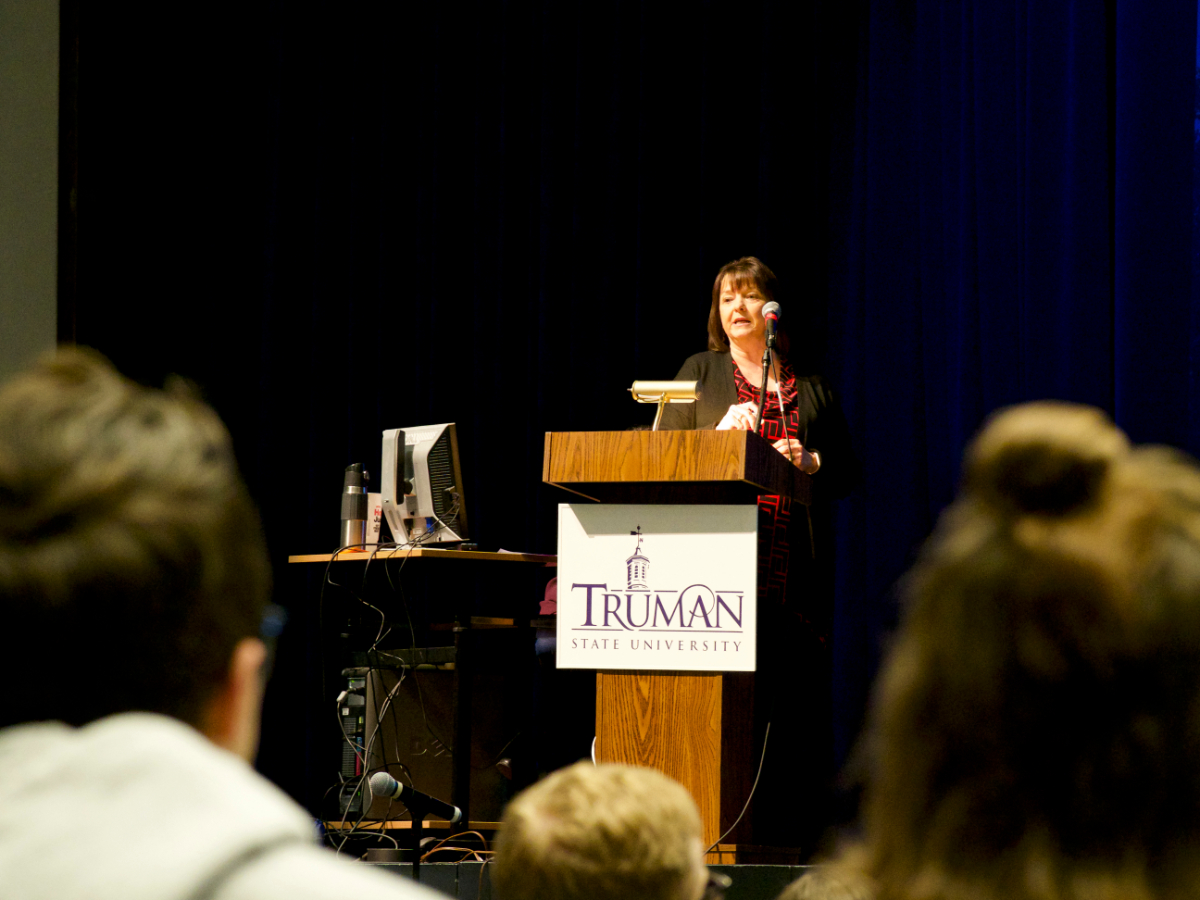
Truman State University will soon exit from the JED program, a mental health advocacy program. After the University graduates from the program, there is a continuation committee to keep the progress moving.
University Counseling Services has been working with the JED program and its committee to continue providing students with the opportunity to receive Truman’s mental health services.
Truman has seen the effects that COVID-19 can have on a college campus, with changes to social life and schoolwork impacting students’ mental health last semester.
JED Campus Background
In the 2016-17 school year, four Truman students committed suicide, three of which were in the Alpha Kappa Lambda fraternity.
Soon after the students’ deaths, Lou Ann Gilchrist, vice president for student affairs at the time, made a statement online stating the collaboration between the JED Foundation, the City of Kirksville and Truman.
The JED Foundation is a nonprofit organization aimed at equipping young adults in high school and college with the skills necessary to promote positive mental health and prevent suicide.
Gilchrist wrote that JED would be on campus to consult with professionals regarding possible actions to address suicide prevention in the Truman community.
Gilchrist also stated that the University would be working with the national office of AKL to implement immediate strategies, develop future courses of action and provide support to Truman’s local chapter and its members.
Soon after, Truman announced the implementation of a four-year, campus-wide program called JED Campus to enhance mental health services on campus.
In 2017, the Truman Homecoming Committee raised funds needed to pay for the program.

Dave Rector, vice president for finance and planning, said the JED membership cost $9,000. There were also programming and student labor fees that added more to that cost, Rector said.
In 2018, the Healthy Minds Survey was sent out to all students. It was anonymous and meant to gauge emotional and mental health on campus.
Read the full Healthy Minds Survey 2017-2018 Data Report here
Consultants from JED analyzed the results, visited campus and made recommendations on how the University can improve its mental health care as part of a more comprehensive campus-wide approach to addressing emotional well-being.
“The JED program involves the whole campus,” Brenda Higgins, vice president for student health and wellness, said. “We will have individuals from higher administration at the University. We will have faculty, a representative from the counseling center, the health center, students and we should have legal affairs [and] admissions. It’s a whole campus kind of thing that will have a positive impact that hopefully radiates out through the whole campus.”
Since 2018, the University has worked to incorporate JED recommendations into a strategic plan for Truman.
Evonne Bird, instructor in the exercise health department, is co-chair for Truman’s JED Committee alongside Higgins.
“We are part of JED Campus, which is a larger group,” Bird said. “We work with the JED Foundation. The idea is to improve mental wellness on campus. That includes students, faculty and staff are included in that as well. Our goal was to go through the recommendations from the JED Committee to see where we could make changes at Truman to improve the culture on campus. This is our third year, so we are almost done. It is a four-year process and we are then considered a JED Alumni.”
University Counseling Services has worked with the University and on committees to support the JED Campus initiatives.
According to the University Counseling Services Annual Report of June 2019 to May 2020, UCS Assistant Director Joe Hamilton was the only person to receive JED training via a webinar out of the six counselors employed at UCS at the time. Hamilton and full-time counselor Madeline Nash both serve on committees supporting the JED initiatives, such as Truman Partners In Prevention.
Since its partnership with the JED program in 2017, the University has sent several surveys to understand student perspectives. When interviewed, senior Emma Kanerva had never heard of the JED program. Kanerva and senior Kaitlyn Owens both said they did not know what the program does for the University.
Bird said the JED committee is currently in the process of completing the post-assessment. Much like the pre-assessment done in 2017, it will determine where the campus currently stands on JED-related issues.
This semester, a student post-assessment survey will be sent to the student body. The survey will allow students to voice their opinions on where the University stands on JED-related issues.
Bird said she thought the team was doing well, but COVID-19 has changed a lot of their procedures.
“Although since COVID hit, I think it will be interesting,” Bird said. “The numbers will be very skewed.”

COVID-19 and Mental Health
Mental health at Truman State University was impacted by COVID-19 last semester, with campus changes affecting students mentally, academically and socially.
COVID-19 and the resulting precautions have made campus interactions difficult, whether in social spaces or the classroom, and these difficulties can lead to a mental toll.
“I think it is all how students and faculty choose to react to the current circumstances,” Janet Gooch, executive vice president for Academic Affairs and Provost, said.
Truman’s Student Health Center has been testing students who have come in close contact with or have symptoms of COVID-19, requiring isolation for positive cases and recommending quarantine for those who have been exposed.
Changes like restrictions in meeting spaces, no breaks during the fall semester and asynchronous classes have impacted both freshmen and upperclassmen.
“The problem for me has been that without breaks, I have had certain weeks this semester where there are heaps of work to do, and with the shortened semester, there’s already more work to do,” sophomore William Berendzen said. “I’m at 15 credit hours, so it’s hard to make sure I get all my work done and keep track of all my classes this semester.”
Even for students who did not feel there has been a particular workload increase last semester, the shortened semester’s effects are still present. Senior Drew Wright said he had seen an increase in deadline extensions from professors due to the shortened semester schedule.
Berendzen, who lives off-campus this year, said this COVID-19 semester was taking its toll. Not only did he describe schoolwork as piling up, but Berendzen said he found himself spending less time on campus because of the COVID-19 precautions and the “looming threat” of falling ill and missing class time.
”I am home way more often than I’d like this semester since all I would do would go back to class and then back home,” Wright said. “Now, since it’s the end of the semester, I’m on campus a little bit more with studying, but I’m still at home way too often.”
The changes due to COVID-19 have had as much of an impact on freshmen as it has on students who have experienced campus life without COVID precautions.
Truman values student life and social interaction, but because of COVID precautions, there is concern among some returning students, like Berendzen and Wright, that freshmen will miss out on meeting new people in their first year of college.
“I do think COVID has had a pretty big impact on my mental health, just because I missed a lot of ‘lasts’ my senior year and now my freshman year of college is kind of messed up,” freshman Ashleynn Gilpatrick said. “I’m a very social person, so doing everything online and being cooped up is definitely not my style.”
While freshmen like Gilpatrick are experiencing the struggles of being on a socially distanced campus, some students have not felt completely shut out.
Freshman Blake Gordon said he has been feeling well adjusted to college life in Kirksville and still makes efforts to be social, even if socially distant.
“Truman has been really fun and a lot better than I expected,” Gordon said. “My biggest challenge is the workload because it is different from high school and requires more work.”
With the increased stress of COVID and the shortened semester with no breaks, students’ workload issues have been a constant for this fall.
Check back in next Thursday, Jan. 28 for additional reporting on this subject.
